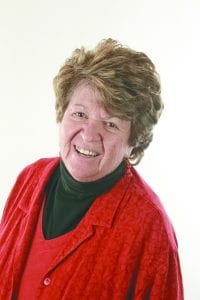Between You and Me: If you can’t remember a name or word, are you losing it?
By Leah S. Dunaief

Publisher
For whatever reason, we, in America, have always had an age bias. We have even been said to worship youth. We buy clothes to make us look younger. We get injections, and we even submit to surgery in order to deceive the eye of the beholder and appear more youthful. Many people have complained about ageism in hiring practices. Women have even bemoaned that they become invisible after age 50. We do crossword puzzles to retain our cognitive abilities.
Is it any wonder, then, that age has recently burst into view concerning our upcoming presidential election? The likely contenders are 77 and 81. That means in January 2029, when the next president will replace one of them, they will be 82 and 86. Until now, Ronald Reagan was the oldest president, leaving office just short of 78.
Both men are being studied for signs that they are too old. Both have had memory lapses. But is memory what determines a person’s ability to perform in a leadership role? Even more crucial, for the rest of us, is memory failure the first sign of impactful cognitive decline and even of encroaching dementia?
According to Dr. Charan Ranganath, professor of psychology and neuroscience, Director of the Dynamic Memory Lab at the University of California, Davis, “As an expert in memory, I can assure you that everyone forgets. In fact, most of the details of our lives—the people we meet, the things we do and the places we go—will inevitably be reduced to memories that capture only a small fraction of those experiences.”
The professor goes on to say, in an Opinion Guest Essay for the New York Times this past Monday, that it is normal to be forgetful as we get older, starting in our 30s. He makes an interesting distinction, however, about memory omissions: There is forgetting and there is Forgetting. To understand the difference is to relax about an occasional lack of memory.
The first (with the small f) describes struggling for that word or name on the tip of our tongue that just cannot be remembered. The professional term for that is “retrieval failure,” and while the word or name is there, we can’t summon it immediately or at all. Those of us who watch “Jeopardy!” on television see examples of that nightly as each contestant struggles to call out the answer to the question first—or as the game works, to call out the proper question to match the answer. They may have the information in their heads but just can’t grab it in time.
Forgetting (with a capital F), however, is when a memory is lost or totally gone. The example of the first, that the professor offers from the political scene, is when the names of the leaders of two countries or people are conflated, as Biden did with Mexico and Egypt and Trump with Pelosi and Haley. An instance of the second is if the President didn’t remember meeting the leader of Egypt at all.
The prefrontal cortex is the brain area that is responsible for daily memory, and it changes somewhat as we age. I prefer to think of it as the Rolodex that becomes so full with thoughts and experiences as we live our lives, that it turns increasingly slowly when called upon to produce a particular memory, like a name or date. While it does turn, it may not retrieve the information until the middle of the next night, and whom can we call with the answer then?
We all want to be “super-agers” and retain our cognitive abilities. There is, according to the professor, a huge degree of variability in cognitive aging. While aging is associated with loss of memory, that should not be equated with cognitive decline.
The professor points out that Harrison Ford, Paul McCartney and Martin Scorsese are the same age as Biden, Jane Fonda is 86, and my mentor in the aging-and-functioning department, Warren Buffett, the head of Berkshire Hathaway, is 93.
So if you can’t come up right away with that name you’re intensely seeking, you’re in good company.







